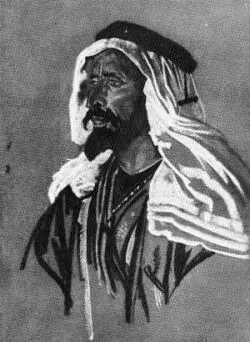Our short stage was to the fort of Sebeil, inland Wejh, where the Egyptian pilgrims used to water. We camped by their great brick tank, in shade of the fort's curtain-wall, or of the palms, and put to rights the deficiencies which this first march had shown. Auda and his kinsmen were with us; also Nesib el Bekri, the politic Damascene, to represent Feisal to the villagers of Syria. Nesib had brains and position, and the character of a previous, successful, desert-journey: his cheerful endurance of adventure, rare among Syrians, marked him out as our fellow, as much as his political mind, his ability, his persuasive good-humoured eloquence, and the patriotism which often overcame his native passion for the indirect. Nesib chose Zeki, a Syrian officer, as his companion. For escort we had thirty-five Ageyl, under ibn Dgheithir, a man walled into his own temperament: remote, abstracted, self-sufficient. Feisal made up a purse of twenty thousand pounds in gold--all he could afford and more than we asked for--to pay the wages of the new men we hoped to enrol, and to make such advances as should stimulate the Howeitat to swiftness.
This inconvenient load of four hundredweight of gold we shared out between us, against the chance of accident upon the road. Sheikh Yusuf, now back in charge of supply, gave us each a half-bag of flour, whose forty-five pounds were reckoned a man's pinched ration for six weeks. This went slung on the riding-saddle, and Nasir took enough on baggage camels to distribute a further fourteen pounds per man when we had marched the first fortnight, and had eaten room for it in our bags.
We had a little spare ammunition and some spare rifles as presents; and loaded six camels with light packs of blasting gelatine for rails or trains or bridges in the north. Nasir, a great Emir in his own place, also carried a good tent in which to receive visitors, and a camel load of rice for their entertainment: but the last we ate between us with huge comfort, as the unrelieved dietary of water--bread and water, week after week, grew uninspiring. Being beginners in this style of travelling, we did not know that dry flour, the lightest food, was therefore the best for a long journey. Six months later neither Nasir nor myself wasted transport and trouble on the rice-luxury.
My Ageyl--Mukheymer, Merjan, Ali--had been supplemented by Mohammed, a blowsy obedient peasant boy from some village in Hauran, and by Gasim, of Maan, a fanged and yellow-faced outlaw, who fled into the desert to the Howeitat, after killing a Turkish official in a dispute over cattle tax. Crimes against tax-gatherers had a sympathetic aspect for all of us, and this gave Gasim a specious rumour of geniality, which actually was far from truth.
We seemed a small party to win a new province, and so apparently others thought; for presently Lamotte, Bremond's representative with Feisal, rode up to take a farewell photograph of us. A little later Yusuf arrived, with the good doctor, and Shefik, and Nesib's brothers, to wish us success on our march. We joined in a spacious evening meal, whose materials the prudent Yusuf had brought with him. His not-slender heart perhaps misgave him at the notion of a bread supper: or was it the beautiful desire to give us a last feast before we were lost in the wilderness of pain and evil refreshment?
After they had gone we loaded up, and started before midnight on another stage of our journey to the oasis of Kurr. Nasir, our guide, had grown to know this country nearly as well as he did his own.
While we rode through the moonlit and starry night, his memory was dwelling very intimately about his home. He told me of their stone-paved house whose sunk halls had vaulted roofs against the summer heat, and of the gardens planted with every kind of fruit tree, in shady paths about which they could walk at ease, mindless of the sun. He told me of the wheel over the well, with its machinery of leathern trip-buckets, raised by oxen upon an inclined path of hard-trodden earth; and of how the water from its reservoir slid in concrete channels by the borders of the paths; or worked fountains in the court beside the great vine-trellised swimming tank, lined with shining cement, within whose green depth he and his brother's household used to plunge at midday.
Nasir, though usually merry, had a quick vein of suffering in him, and to-night he was wondering why he, an Emir of Medina, rich and powerful and at rest in that garden-palace, had thrown up all to become the weak leader of desperate adventures in the desert. For two years he had been outcast, always fighting beyond the front line of Feisal's armies, chosen for every particular hazard, the pioneer in each advance; and, meanwhile, the Turks were in his house, wasting his fruit trees and chopping down his palms. Even, he said, the great well, which had sounded with the creak of the bullock wheels for six hundred years, had fallen silent; the garden, cracked with heat, was becoming waste as the bund hills over which we rode.
After four hours' march we slept for two, and rose with the sun. The baggage camels, weak with the cursed mange of Wejh, moved slowly, grazing all day as they went. We riders, light-mounted, might have passed them easily; but Auda, who was regulating our marches, forbade, because of the difficulties in front, for which our animals would need all the fitness we could conserve in them. So we plodded soberly on for six hours in great heat. The summer sun in this country of white sand behind Wejh could dazzle the eyes cruelly, and the bare rocks each side our path threw off waves of heat which made our heads ache and swim. Consequently, by eleven of the forenoon we were mutinous against Auda's wish still to hold on. So we halted and lay under trees till half-past two, each of us trying to make a solid, though shifting shadow for himself by means of a doubled blanket caught across the thorns of overhanging boughs.
We rode again, after this break, for three gentle hours over level bottoms, approaching the walls of a great valley; and found the green garden of El Kurr lying just in front of us. White tents peeped from among the palms. While we dismounted, Rasim and Abdulla, Mahmud, the doctor, and even old Maulud, the cavalryman, came out to welcome us. They told us that Sherif Sharraf, whom we wished to meet at Abu Raga, our next stopping place, was away raiding for a few days. This meant that there was no hurry, so we made holiday at El Kurr for two nights.
 Auda Abu Tayi
Auda Abu Tayi
It contented me: for the trouble of boils and fever which had shackled me in Wadi Ais had come afresh, more strongly, making each journey a pain, and each rest a blessed relaxation of my will strong to go on--a chance to add patience to a scant reserve. So I lay still, and received into my mind the sense of peace, the greenness and the presence of water which made this garden in the desert beautiful and haunting, as though pre-visited. Or was it merely that long ago we had seen fresh grass growing in the spring?
The inhabitant of Kurr, the only sedentary Belluwi, hoary Dhaif-Allah, laboured day and night with his daughters in the little terraced plot which he had received from his ancestors. It was built out of the south edge of the valley in a bay defended against flood by a massive wall of unhewn stone. In its midst opened the well of clear cold water, above which stood a balance-cantilever of mud and rude poles. By this Dhaif-Allah, morning and evening when the sun was low, drew up great bowls of water and spilled them into clay runnels contrived through his garden among the tree roots. He grew low palms, for their spreading leaves shaded his plants from the sun which otherwise might in that stark valley wither them, and raised young tobacco (his most profitable crop); with smaller plots of beans and melons, cucumbers and egg-plants, in due season.
Читать дальше

 Auda Abu Tayi
Auda Abu Tayi










